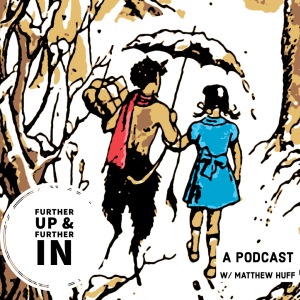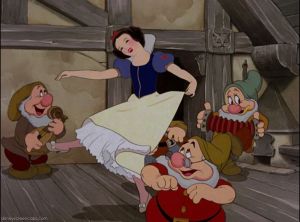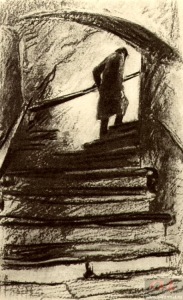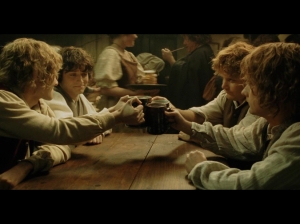 As my classes this year begin to wind down, I find myself making frequent glances in the rearview mirror, looking back at all the worlds I have led my students through. From the electric streetlights of New York to the vast acreage of the Russian countryside, from the courts of Denmark to the Paris Opera House, the wintry streets of Victorian London to the cramped apartment of a desperate salesman*, I am taken aback by the sheer beauty and splendor afforded in the simple pleasure of reading books.
As my classes this year begin to wind down, I find myself making frequent glances in the rearview mirror, looking back at all the worlds I have led my students through. From the electric streetlights of New York to the vast acreage of the Russian countryside, from the courts of Denmark to the Paris Opera House, the wintry streets of Victorian London to the cramped apartment of a desperate salesman*, I am taken aback by the sheer beauty and splendor afforded in the simple pleasure of reading books.
One particular glory, and perhaps the preeminent one, is the power stories have to speak the truth. As someone once said, fiction is “the lie that tells the truth,” and so, I’d like to share three classic works of fiction that, I contend, edify and encourage the believer through their depiction of the Great Story that God is telling. These are simply a small handful of works that reveal, in some measure, either in their portrayal of man’s tragedy or his redemption, the awesome wonder of the Gospel of Jesus Christ.
- Silas Marner by George Eliot
Falsely accused and abandoned by both his fiancee and his best friend, the weaver Silas Marner’s most grievous despair comes from the loss of his faith in the process. God, it would seem, has also withdrawn, leaving him desperate and alone in a home that has lost all familiarity, all comfort. So Silas retreats from his beloved old life and further into the darkened caverns of his battered heart.
Yet, in true form, all is not lost, for God, the beloved Father, has never left Silas Marner’s side. As the weaver burrows himself deeper in his gloom, God sends a wandering, helpless child through his door, toddling her way to the warm fire. As the novel progresses, Silas must learn to father little Eppie and raise her to love and care in a world lacking such virtues. A beautiful work of loss and redemption, sadness and joy, Silas Marner shows us the goodness of a sovereign God who designs all things, both sorrow and gladness, to His fullest glory.
2. Great Expectations by Charles Dickens
Pip, the poor orphan boy raised “by hand” by an abusive sister, lives on the scraps and meager margins of life. Opening the novel alone in his parents’ graveyard, Pip suddenly finds himself on the receiving end of death threats from a hardened, terrifying convict, demanding food and a file to free his chains. Yet, though Pip has nothing of a future ahead of him, he dreams of a life in London, the top hats and cobblestone streets, the theater and the busy coaches. In short, Pip dreams of being a somebody. And so, when a mysterious benefactor sends him an inexplicably magnificent fortune, granting Pip the impossible opportunity to attain his expectations, Pip is ecstatic.
But, as Pip finds, not all that glitters is gold. Throughout Pip’s experience in the city, he must, both literally and figuratively, wave the fog and chimney mist from his eyes, constantly wiping away the crumbling illusions of his makeshift fantasies. The world, Pip discovers, is greedier, crueler, dirtier, and lonelier than he had imagined. What remains for Pip, then, is to watch his worldly ambitions fade to nothing only to discover the true joy and grace that had been beckoning to him all along. Considered by many to be Dickens’ masterpiece, Great Expectations guides its reader from the warmth of home to the prodigal “far country” and, thankfully, back again with the spiritual richness and stylistic aplomb typical of Dickensian fiction.
3. Frankenstein by Mary Shelley
At once both Gothic thriller and philosophical discourse, Frankenstein perhaps is one of the more misrepresented works of Romantic literature. Dr. Victor Frankenstein is obsessed with scientific exploration and daring feats of progress, namely, the discovery of reanimation and the source of life. Written in the short wake of Galvani’s work with electricity, Shelley’s novel examines the ethical, social, and religious implications of playing God as Frankenstein assembles a motley cadaver from dead men’s limbs and surges it to life. Yet, the creature he thought would bring him worldwide renown and adoration in the scientific community turns out to be a harrowing monster, eight feet tall and more powerful than Frankenstein had ever dreamed. What follows is a cat-and-mouse pursuit as Frankenstein runs from his creature and, ultimately, the consequences of his deeds.
The true beauty of this novel, however, lies in the way Shelley provokes sympathy for the monster. In her world, this creature becomes a being that longs to know its telos, its purpose, in this hostile and chaotic world. The monster, in this sense, is transformed into a type of Adam, created and designed by an expert hand, as he subsequently roams western Europe in search of his maker. Perhaps the most climactic and stirring moment occurs when Frankenstein and his monster meet atop Mount Blanc, embodying the classic , almost mythical confrontation between creature and creator. In this sequence, the monster finally interrogates Frankenstein, begging him to accept him, love him, and explain his purpose for being. Yet, for all his earnest pleading, the monster receives no kindness in turn as Frankenstein berates and abandons him, damning him to his alienated and miserable state alone and confused.
As awful as Frankenstein treats his creature, the story awakens the reader’s heart to the contrary opportunity we all have in addressing our own Maker. Unlike Frankenstein, He will never spurn us with disgust; rather, we serve a good Father who made us in His living image, not from the rotted, corroding skin of death. In this way, Frankenstein shows us the inadequacy of humanism compared to the lovingkindness of a sovereign God. We, as it turns out, make lousy gods.
*These works are The Great Gatsby, The Seagull, Hamlet, The Phantom of the Opera, Great Expectations, and The Metamorphosis.

 One of the most common arguments (though often fired off as an accusation) that Christians hear against the notion of a good and loving God is that such a God, were he truly good and loving, would not send good and loving people to a realm of eternal punishment. How could such a kind and gracious God possibly damn someone to hell? Doesn’t he love everyone?
One of the most common arguments (though often fired off as an accusation) that Christians hear against the notion of a good and loving God is that such a God, were he truly good and loving, would not send good and loving people to a realm of eternal punishment. How could such a kind and gracious God possibly damn someone to hell? Doesn’t he love everyone? A little over a year ago, I wrote a
A little over a year ago, I wrote a  When Snow White arrives at the dwarves’ cottage, we see a warm and inviting portrayal of Eden: there are chores and tasks to be done (to the blissful tunes of whistling while you work, of course), there is community and fellowship, and the cottage is alive with song and dance. Merriment abounds. The story presents this way of life as a perfect balance of duty and desire; each person has a role to fill, and he or she fills it gladly. Sneezy is the one who sneezes, Happy is the one who is happy, Grumpy is the one who is grumpy, and so on.
When Snow White arrives at the dwarves’ cottage, we see a warm and inviting portrayal of Eden: there are chores and tasks to be done (to the blissful tunes of whistling while you work, of course), there is community and fellowship, and the cottage is alive with song and dance. Merriment abounds. The story presents this way of life as a perfect balance of duty and desire; each person has a role to fill, and he or she fills it gladly. Sneezy is the one who sneezes, Happy is the one who is happy, Grumpy is the one who is grumpy, and so on.
 Edenic paradise, God’s story tells us, is subject to the rebellion of man. It was only a matter of time before Snow White would face the choice to fall from the warmth and glory of her perfect home. And fall she does as she fills her mouth with the false deliciousness of the Queen’s poisoned apple and succumbs to the deep sleep of death. Yet, this sleeping death is no individual affair; the effects of her sin are not limited to her lifeless body. Indeed, all of nature is bent by her fall, and when the dwarves encase the body of Snow White in the glass coffin, all of creation attends to mourn the death of Beauty. It is a truly eerie scene in the film; Snow White lies beneath the numb sheet of sin and death, quiet and still, as her dwarves weep softly around her and all of the woodland creatures draw near to see and to mourn. In their sorrow, they know that ultimate Beauty has died and their perfect world has been damaged by darkness and evil. All of creation feels the sting.
Edenic paradise, God’s story tells us, is subject to the rebellion of man. It was only a matter of time before Snow White would face the choice to fall from the warmth and glory of her perfect home. And fall she does as she fills her mouth with the false deliciousness of the Queen’s poisoned apple and succumbs to the deep sleep of death. Yet, this sleeping death is no individual affair; the effects of her sin are not limited to her lifeless body. Indeed, all of nature is bent by her fall, and when the dwarves encase the body of Snow White in the glass coffin, all of creation attends to mourn the death of Beauty. It is a truly eerie scene in the film; Snow White lies beneath the numb sheet of sin and death, quiet and still, as her dwarves weep softly around her and all of the woodland creatures draw near to see and to mourn. In their sorrow, they know that ultimate Beauty has died and their perfect world has been damaged by darkness and evil. All of creation feels the sting.

 I am working my way through Fyodor Dostoevsky’s Crime and Punishment and was struck by one of its early scenes depicting a drunkard in a St. Petersburg tavern bemoaning his vices, as well as the costs they have accumulated, to the novel’s protagonist Rodya Raskolnikov.
I am working my way through Fyodor Dostoevsky’s Crime and Punishment and was struck by one of its early scenes depicting a drunkard in a St. Petersburg tavern bemoaning his vices, as well as the costs they have accumulated, to the novel’s protagonist Rodya Raskolnikov. It is often said that in the land of the blind, the one-eyed man is king. Yet, what must be said of the two-eyed man?
It is often said that in the land of the blind, the one-eyed man is king. Yet, what must be said of the two-eyed man? In an age of rampant cynicism, intense narcissism, and deep defiance toward absolutes such as truth, goodness, and beauty, the ache for passionate and rich festivity must burn ever more feverishly in our hearts. This sour world, lost in the mirrors of its vanity and drowning in the white noise of feeds, posts, snaps, and late-night binges, is in dire need of a good feast, what Tolkien saw as an evening by the fire, filled with boisterous laughter and great dancing. Or, as Lewis saw, what greater way to herald the breaking of winter than the carousing of creatures at the coming of spring? The promise of resurrection is a great promise, full and strong, breaking like the tide against this screen-drunk land.
In an age of rampant cynicism, intense narcissism, and deep defiance toward absolutes such as truth, goodness, and beauty, the ache for passionate and rich festivity must burn ever more feverishly in our hearts. This sour world, lost in the mirrors of its vanity and drowning in the white noise of feeds, posts, snaps, and late-night binges, is in dire need of a good feast, what Tolkien saw as an evening by the fire, filled with boisterous laughter and great dancing. Or, as Lewis saw, what greater way to herald the breaking of winter than the carousing of creatures at the coming of spring? The promise of resurrection is a great promise, full and strong, breaking like the tide against this screen-drunk land. As my classes this year begin to wind down, I find myself making frequent glances in the rearview mirror, looking back at all the worlds I have led my students through. From the electric streetlights of New York to the vast acreage of the Russian countryside, from the courts of Denmark to the Paris Opera House, the wintry streets of Victorian London to the cramped apartment of a desperate salesman*, I am taken aback by the sheer beauty and splendor afforded in the simple pleasure of reading books.
As my classes this year begin to wind down, I find myself making frequent glances in the rearview mirror, looking back at all the worlds I have led my students through. From the electric streetlights of New York to the vast acreage of the Russian countryside, from the courts of Denmark to the Paris Opera House, the wintry streets of Victorian London to the cramped apartment of a desperate salesman*, I am taken aback by the sheer beauty and splendor afforded in the simple pleasure of reading books.